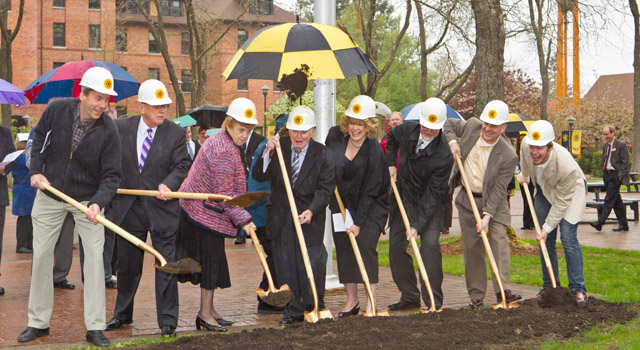Page 518 • (13,154 results in 0.057 seconds)
-

school prerequisites at a community college, setting her up to begin the entry-level master’s program at PLU in June 2010. Master of Science in NursingLearn more about the MSN program options and the Doctor of Nursing Practice, PLU's newest graduate nursing program. “Everything just fell together,” said Erickson, who earned her bachelor’s degree in linguistics from the University of Washington. Erickson ’12 is one of several graduates of the master’s program who have returned to teach in the School
-
service or research with explicit learning objectives, preparation, and reflection. Students involved in community-engaged learning are expected not only to provide direct community service or respond to questions generated among community partners, but also to learn about the context in which the service is provided, the connection between service or research and their academic coursework, and their roles as citizens (Seifer, S.; Jacoby, B.). Benefits of CELBenefit of CEL for students: Personal and
-

May 5, 2012 John Korsmo ’84, President Loren J. Anderson, Sigrunn Ness, Kaare Ness, MaryAnn Anderson, Bruce Bjerke ’72 – chair of the Board of Regents, Bob Katica – BCRA Design, and Jordan Beck ’12 turn the dirt for the groundbreaking of phase II of the Karen Hille Phillips Center for the Performing Arts. (Photos by John Froschauer) A dream coming to fruition By Chris Albert On May 5, groundbreaking for phase II of the Karen Hille Phillips Center for the Performing Arts took place. “This is a
-
FAQsWhat is the average length of time to find employment post-graduation?We survey our graduates each December/January, and the following is based on the total number of responses received. The last two columns show how many months graduates were typically looking for work, and the average length of time to find employment post-graduation. Graduating Year # Responses / # Graduates Average # Months Looking Average # Months Post Grad to Find Employment 2016 9/19 .4 -.1 2015 18/23 1.58 .25 2014
-
Step 9: Understand your on-going responsibilities once approvedHPRB approval (expedited/full board) lasts for one year. During that time, you are responsible for:Requesting changes to your HPRB proposal (Amendments/Modifications)If at any time you wish to make any change to the research proposal—including participants, procedures, instruments, and/or investigators—originally approved by the HPRB, you must submit an Amendment request within Mentor. You may not initiate any of these changes until
-

. The challenge, she says, is that she’s enjoying every aspect of her studies. That’s no surprise, because getting to medical school – and becoming a doctor – has been her lifelong goal.After double majoring in chemistry and classics at PLU, Hatton spent three years working as a medical scribe and a certified nursing assistant with medically fragile children before beginning her graduate studies. To prepare for medical school, she completed the one-year Master of Arts in Medical Sciences (MAMS
-
Additionally, all entering students are required by state law to undergo criminal history screening at both the state and national level. All Washington schools of nursing are required to have clearance verification on students prior to participation in clinical experiences. The state and/or national criminal history background check must be repeated every year. Students will be alerted to these requirements as they become due. A criminal history may necessitate withdrawal from nursing classes
-

true embodiment of this idea. At PLU, Xi Zhu is a teacher, with valuable knowledge and deep interest in Chinese pre-modern literature. But every day this past fall, after teaching his course at PLU, Zhu commuted north to the University of Washington to take a class for his PhD. While both teaching a class and taking a class, Zhu was also working on his dissertation. As a doctoral student, Zhu is studying a manuscript version of a pre-300 B.C.E. Chinese text known in English as the Classic of Odes
-
Reading Room Procedures Use of Archives and Special Collections materials requires completion of a Researcher Registration Form. Additional application forms may be required for certain collections or records. The Archives and Special Collections’ holdings are non-circulating and stored in closed stacks. Archives and Special Collections staff will retrieve and return materials requested by researchers. No food, drink, bags, or coats are allowed on reading room tables when Archives and Special
-
Learn More: Bongo Grave PostThe Bongo ethnic group is located in Sudan and is made up of many family sub-divisions. In his research paper about the Bongo, Santandrea categorizes the Bongo into two main groups: the Tonj kinsmen and the Wau. Within these groups there can be even more sub-divisions. There is little chiefdom organization and a clear system has not been developed. As a result, there are not chiefdoms that have been in charge for several generations. This allows for more diversity in
Do you have any feedback for us? If so, feel free to use our Feedback Form.


